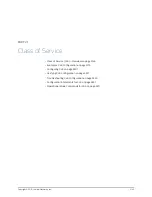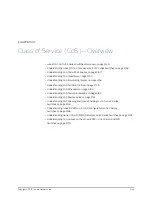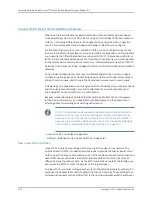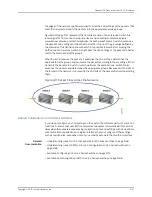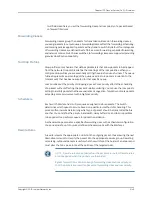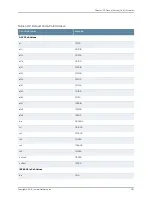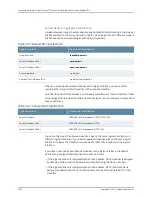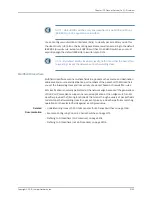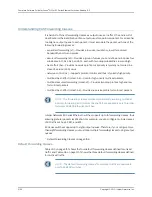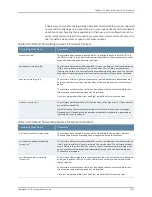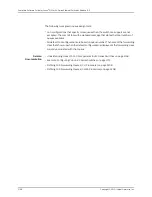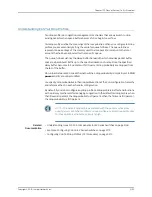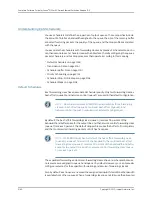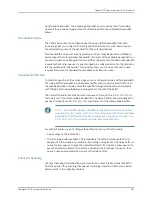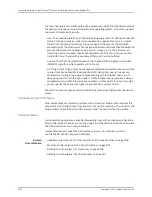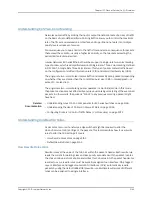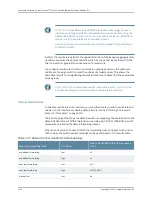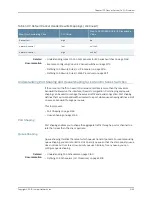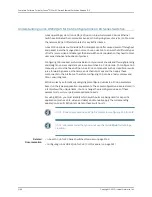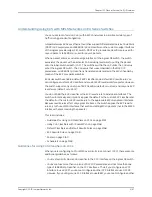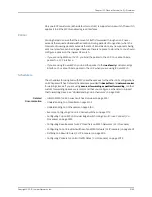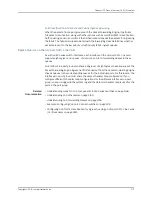
If desired, you can rename the forwarding classes associated with the queues supported
on your switch. Assigning a new class name to an output queue does not alter the default
classification or scheduling that is applicable to that queue. CoS configurations can be
quite complicated, so unless it is required by your scenario, we recommend that you not
alter the default class names or queue number associations.
Table 405: Default Forwarding Classes for Unicast Packets
Comments
Forwarding Class Name
The software does not apply any special CoS handling to packets with 000000 in
the DiffServ field. This is a backward compatibility feature. These packets are usually
dropped under congested network conditions.
best-effort (be)
The software delivers assured bandwidth, low loss, low delay, and low delay variation
(jitter) end-to-end for packets in this service class. The software accepts excess
traffic in this class, but in contrast to the assured forwarding class, the out-of-profile
expedited-forwarding class packets can be forwarded out of sequence or dropped.
expedited-forwarding (ef)
The software offers a high level of assurance that the packets are delivered as long
as the packet flow from the customer stays within a certain service profile that you
define.
The software accepts excess traffic, but it applies a tail drop profile to determine if
the excess packets are dropped and not forwarded.
Up to two drop probabilities (low and high) are defined for this service class.
assured-forwarding (af)
The software delivers packets in this service class with a high priority. (These packets
are not delay-sensitive.)
Typically, these packets represent routing protocol hello or keep alive messages.
Because loss of these packets jeopardizes proper network operation, packet delay
is preferable to packet discard.
network-control (nc)
Table 406: Default Forwarding Classes for Multicast Packets
Comments
Forwarding Class Name
The software does not apply any special CoS handling to the multicast packets.
These packets are usually dropped under congested network conditions.
multicast best-effort (mcast-be)
The software delivers assured bandwidth, low loss, low delay, and low delay variation
(jitter) end-to-end for multicast packets in this service class. The software accepts
excess traffic in this class, but in contrast to the multicast assured forwarding class,
out-of-profile multicast expedited-forwarding class packets can be forwarded out
of sequence or dropped.
multicast expedited-forwarding
(mcast-ef)
The software offers a high level of assurance that the multicast packets are delivered
as long as the packet flow from the customer stays within a certain service profile
that you define.
The software accepts excess traffic, but it applies a tail drop profile to determine if
the excess packets are dropped and not forwarded.
Up to two drop probabilities (low and high) are defined for this service class.
multicast assured-forwarding
(mcast-af)
3157
Copyright © 2010, Juniper Networks, Inc.
Chapter 107: Class of Service (CoS)—Overview
Summary of Contents for JUNOS OS 10.3 - SOFTWARE
Page 325: ...CHAPTER 17 Operational Mode Commands for System Setup 229 Copyright 2010 Juniper Networks Inc ...
Page 1323: ...CHAPTER 56 Operational Mode Commands for Interfaces 1227 Copyright 2010 Juniper Networks Inc ...
Page 2841: ...CHAPTER 86 Operational Commands for 802 1X 2745 Copyright 2010 Juniper Networks Inc ...
Page 3367: ...CHAPTER 113 Operational Mode Commands for CoS 3271 Copyright 2010 Juniper Networks Inc ...
Page 3435: ...CHAPTER 120 Operational Mode Commands for PoE 3339 Copyright 2010 Juniper Networks Inc ...
Page 3529: ...CHAPTER 126 Operational Mode Commands for MPLS 3433 Copyright 2010 Juniper Networks Inc ...

